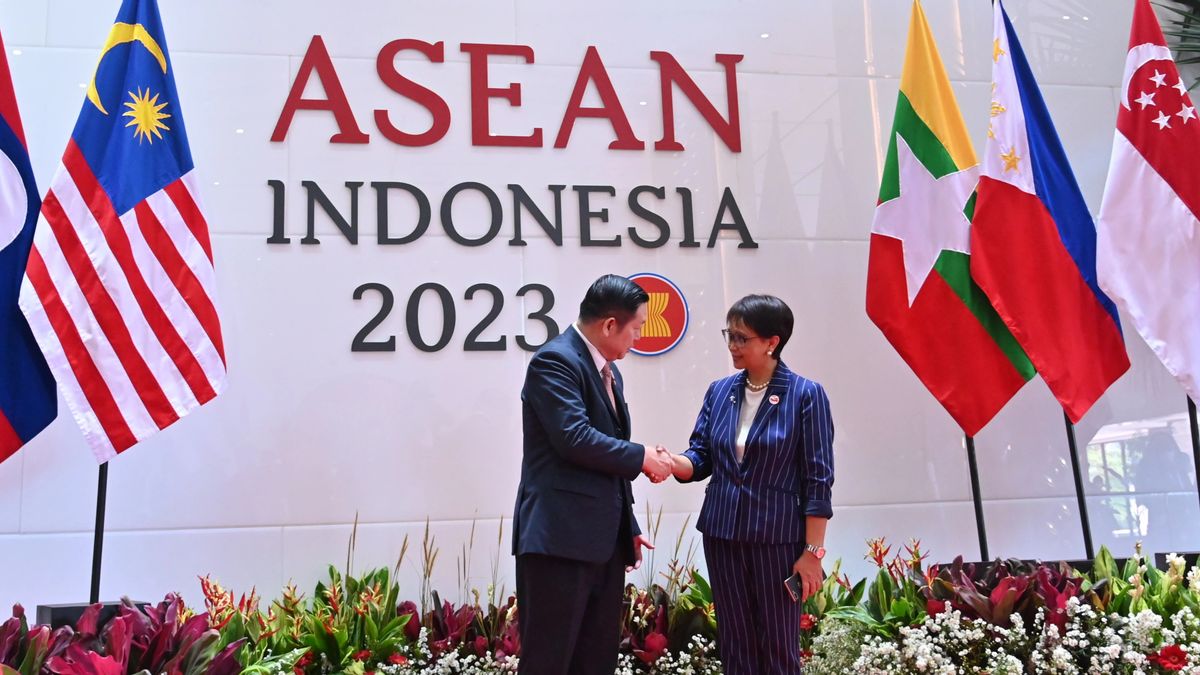JAKARTA - From 9 to 11 May 2023, leaders of the Association of Southeast Asian Nations (ASEAN) will sit back together to discuss what they can do to treat the problems ASEAN is currently facing and later. The meeting will take place in Labuan Bajo, West Manggarai Regency, East Nusa Tenggara.
There are high expectations for Indonesia to become Chair of ASEAN this year, especially because it successfully held a G20 meeting last year.
After 11 years without Indonesia sitting in the chair, ASEAN, is now chaired again by Indonesia, when the challenges of the times are getting more complicated.
These challenges, ranging from Myanmar, post-COVID-19 recovery, to geopolitical conditions that dragged large forces into conflict, to remote areas in Southeast Asia.
Despite being faced with major obstacles in streamlining its chairmanship in the G20, especially the Ukraine-Russia war and the post-COVID-19 global economy that were ambushed by inflation and supply chain crises, Indonesia successfully chaired the group of 19 countries plus the European Union.
One of these successes, seen from the G20 agreement to form a Pandemic Fund worth US$1.4 billion for poor countries to anticipate global health threats in the future.
ASEAN hopes that Indonesia will duplicate the success of chairing the G20, within the scope of the region.
Indonesia is also considered not to move like Cambodia a year ago, which was not very effective in leading ASEAN in solving regional problems, ranging from post-pandemic economic order, influence competition between the United States and China, territorial disputes in the South China Sea, to climate change that are increasingly needed. joint efforts at all levels, including the ASEAN level.
For the matter of Myanmar, ASEAN looks "way in place" in overcoming political and humanitarian issues there after in 2021 the junta will coup the government as a result of democratic elections.
In the South China Sea, ASEAN has also not been able to formulate a common stance, especially after Cambodia refused to include the term "dispute" in the resolution of the conflict in this area.
Prime Minister Hun Sen's government is also ineffective in encouraging the improvement of the situation in Myanmar.
Instead, he invited the junta to attend the ASEAN forums when the Myanmar junta had no good faith in realizing the Five-Point Consensus that ASEAN had agreed.
The five points are stopping violence, dialogue of all stakeholders, appointing special envoys to facilitate dialogue, allowing ASEAN to provide humanitarian assistance, and granting access to ASEAN envoys to meet all parties in Myanmar.
Indonesia is one of a number of ASEAN members who rejected Hun Sen's initiative. This kind of assertiveness must be continued, especially since the situation in Myanmar is getting more complicated.
However, ASEAN also needs to convince countries that seem to want a status quo in Myanmar, such as China, India, and Thailand.
The countries bordering Myanmar do not seem to want major changes in Myanmar, including restoring the government elected through democratic elections three years ago.
Not to mention Russia, which is an important partner of the Myanmar junta and is trying to be present in areas anywhere where the United States and the West project their influence.
Myanmar's solution cannot be overcome alone by Indonesia and ASEAN, and on the contrary requires consultation with interested countries in Myanmar.
However, ASEAN must convince the junta and those who support it that the junta cannot continue to prevent ASEAN from helping solve Myanmar's problems.
This is because positive changes in Myanmar are not only a must for the sake of peace in the country and the region, but will also help create a positive atmosphere in ASEAN that makes the problems of other more severe areas can be addressed in a stronger and more effective joint framework.
As written by Antara, these tough issues are geopolitical dynamics that are increasingly heated by conflicts of interest between great powers, such as the United States, China, Russia, and India. Even the European Union, Australia, Japan, and South Korea.
Tum bukan kepentingan itu merangkap ke mana-lalu, dari masalah keamanan sampai ekonomi di mana Asia Tenggara tak bisa lari dari pengaruhan eksternal ASEAN.
That includes the Indo Pacific Economic Framework (IPEF) involving many countries in eastern Asia, but excluding China and Russia, and the Four-Party Security Dialogue or Quadantara Australia, India, Japan, and the United States.
There is still AUKUS, which is a trilateral security pact between Australia, Britain and the United States which was announced September 15 two years ago.
As with China and Russia, these two countries are also actively maneuvering, one of which is through joint military exercises. This is not without reason.
The issue of Taiwan, North Korea's nuclear threat, the regional dispute between Japan and China in an island south of Japan, and Japan's attempt to regain its northern territory occupied by Russia months before the Second World War ended, was among the causes.
These problems are far outside the ASEAN territory, but the impact is certain to reach Southeast Asia.
A number of ASEAN countries themselves have a fierce conflict with China in the South China Sea, especially the Philippines and Vietnam. These are situations that ASEAN must face and make up.
Another thing, such situations often make ASEAN members have different opinions, so they then take their own steps outside the ASEAN framework.
They think ASEAN is not firm enough in its attitude, including in the disputed areas of the South China Sea.
This uncoupled attitude itself benefits the great powers fighting for influence in Southeast Asia.
In this context, stepping into a strong shared vision becomes an urgent need.
Not only for the sake of ASEAN's integrity and integrity, but also for the sake of making this regional organization the main regional mechanism for Southeast Asian countries.
Indonesia, while chairing ASEAN this year, adheres to the theme ASEAN Matters: Epicentrum of Growth which contains three important elements, which include efforts to strengthen ASEAN capacity and effectiveness, ASEAN unity, and ASEAN centrality.
It would be better if all that was preceded by efforts to overcome pressing problems in the region today, including restoring democracy and an inclusive order in Myanmar, and a formulation of joint steps in the South China Sea.
This could be one of the answers to questions about ASEAN relevance, apart from being a new point in making ASEAN members bound in the regional mechanism.
The issue of feeling attached to being urgent is due to too many problems in the region that look "on the way", including the issue of Myanmar and the increasingly violent friction in the South China Sea.
For this reason, ASEAN should think about how to cure feelings of being attached to all members, if not the element of forcing, in every consensus, even though it is not necessary to apply in the European Union.
SEE ALSO:
The English, Chinese, Japanese, Arabic, and French versions are automatically generated by the AI. So there may still be inaccuracies in translating, please always see Indonesian as our main language. (system supported by DigitalSiber.id)















